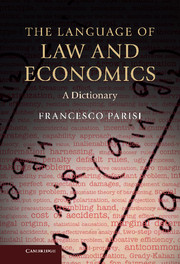N
Published online by Cambridge University Press: 04 August 2017
Summary
Nash bargaining solution: the general consensus, among economists and lawyers alike, is that uncoerced bargaining can allow parties to arrive at the set of alternatives that is best for them, and that is best for society as a whole. Starting with Francis Edgeworth (1881) and John Hicks (1932), economists have tried to understand the process of bargaining. John Nash’s (1950b) work on bargaining has provided a valuable paradigm for modeling how human beings make decisions in the process of bargaining. Nash explores the concept of bargaining in a two-person game. In the game, both players have a fixed set of alternatives. If the players choose certain alternatives, they will achieve certain results. If the players fail to agree, they will achieve a certain, less desirable result (called the disagreement point or disagreement payoff). Each player has the power to veto every result aside from the least desirable result. The Nash bargaining solution holds that the two players in this game will, through negotiation, arrive at the set of alternatives that maximizes the product of their utility gains from the bargaining (called the Nash product). On the basis of this result, public choice and social choice scholars (Sen, 1970; Kaneko and Nakamura, 1979; Mueller, 2003) have formulated a Nash social welfare function, in which the welfare of society is maximized through a hypothetical Nash bargaining scheme. See also axiomatic theory of bargaining and Nash criterion of welfare.
- Type
- Chapter
- Information
- The Language of Law and EconomicsA Dictionary, pp. 191 - 205Publisher: Cambridge University PressPrint publication year: 2013

